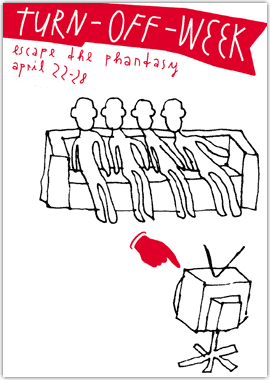 |

|
A week without TV! (22-28 April) [french info] [english info] [Adbuster's campaign] [Antipub's campaign] [Fravia's own contribution] |
"Je n'ai qu'une vie. Je ne la regarderai pas passer par procuration devant un poste de télévision"
 |

|
A week without TV! (22-28 April) [french info] [english info] [Adbuster's campaign] [Antipub's campaign] [Fravia's own contribution] |
| ~S~ fravia+, 22 march 2000, updated 13 March 2001 |
